
Salmacis was an atypical Naiad nymph of Greek mythology. She rejected the ways of the virginal Greek goddess Artemis in favour of vanity and idleness.

Ariodante is an opera seria in three acts by George Frideric Handel. The anonymous Italian libretto was based on a work by Antonio Salvi, which in turn was adapted from Canti 4, 5 and 6 of Ludovico Ariosto's Orlando Furioso. Each act contains opportunities for dance, originally composed for dancer Marie Sallé and her company.
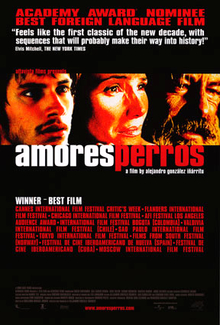
Amores perros is a 2000 Mexican psychological drama film directed by Alejandro González Iñárritu and written by Guillermo Arriaga, based on a story by them both. Amores perros is the first installment in González Iñárritu's "Trilogy of Death", succeeded by 21 Grams and Babel. It makes use of the multi-narrative hyperlink cinema style and features an ensemble cast. The film is constructed as a triptych: it contains three distinct stories connected by a car crash in Mexico City. The stories centre on a teenager in the slums who gets involved in dogfighting; a model who seriously injures her leg; and a mysterious hitman. The stories are linked in various ways, including the presence of dogs in each of them.

The Adventures of Leucippe and Clitophon, written by Achilles Tatius in eight books, is the second-longest of the five surviving Ancient Greek romances, and the only one to exhibit genuine humour.

Il ritorno d'Ulisse in patria is an opera consisting of a prologue and five acts, set by Claudio Monteverdi to a libretto by Giacomo Badoaro. The opera was first performed at the Teatro Santi Giovanni e Paolo in Venice during the 1639–1640 carnival season. The story, taken from the second half of Homer's Odyssey, tells how constancy and virtue are ultimately rewarded, treachery and deception overcome. After his long journey home from the Trojan Wars Ulisse, king of Ithaca, finally returns to his kingdom where he finds that a trio of villainous suitors are importuning his faithful queen, Penelope. With the assistance of the gods, his son Telemaco and a staunch friend Eumete, Ulisse vanquishes the suitors and recovers his kingdom.
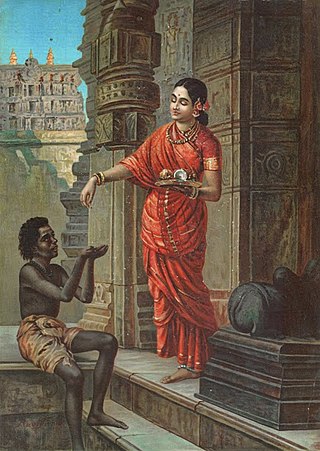
Mandodari was the queen consort of Ravana, the king of Lanka, according to the Hindu epic Ramayana. The Ramayana describes her as beautiful, pious, and righteous. She is extolled as one of the Panchakanya, the recital of whose names is believed to dispel sin.

Orlando is an opera seria in three acts by George Frideric Handel written for the King's Theatre in London in 1733. The Italian libretto was adapted from Carlo Sigismondo Capece's L'Orlando after Ludovico Ariosto's Orlando Furioso, which was also the source of Handel's operas Alcina and Ariodante. More an artistic than a popular success at its first performances, Orlando is today recognised as a masterpiece.
Love at first sight is a personal experience and a common theme in creative works: a person or character feels an instant, extreme, and ultimately long-lasting romantic attraction for a stranger upon first seeing that stranger. It has been described by poets and critics since the emergence of ancient Greece.
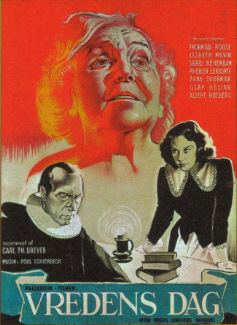
Day of Wrath is a 1943 Danish drama film directed by Carl Theodor Dreyer and starring Lisbeth Movin, Thorkild Roose and Preben Lerdorff Rye. It is an adaptation of the 1909 play Anne Pedersdotter by Hans Wiers-Jenssen, based on a 16th century Norwegian case. The film tells the story of a young woman who is forced into a marriage with an elderly pastor after her late mother was accused of witchcraft. She falls in love with the pastor's son and also comes under suspicion of witchcraft.
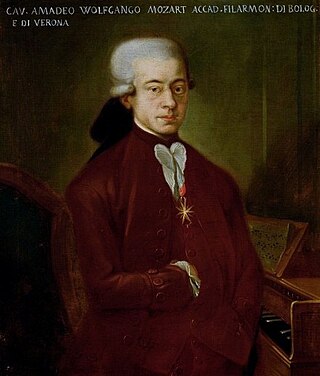
Ascanio in Alba, K. 111, is a pastoral opera in two parts by Wolfgang Amadeus Mozart to an Italian libretto by Giuseppe Parini. It was commissioned by the Empress Maria Theresa for the wedding of her son, Archduke Ferdinand Karl, to Maria Beatrice d'Este on 15 October 1771.

Daphne, Op. 82, is an opera in one act by Richard Strauss, subtitled "Bucolic Tragedy in One Act". The German libretto was by Joseph Gregor. The opera is based loosely on the mythological figure Daphne from Ovid's Metamorphoses and includes elements taken from The Bacchae by Euripides.
More Dissemblers Besides Women is a Jacobean stage play, a tragicomedy written by Thomas Middleton, and first published in 1657.

Ys are two different anime series, released as original video animation series, both of which are based on the video game series Ys. The first series spans seven episodes and covers the general plotline of the first game of the series, Ys I: Ancient Ys Vanished. The plot centers on Adol Christin as he journeys to the island of Esteria in search of adventure. Upon arrival, he learns that a dark priest known as Dark Fact has been tearing the island apart in search of six mystical tomes of power, the Books of Ys.

This Modern Age is a 1931 American pre-Code Metro-Goldwyn-Mayer feature film directed by Nick Grinde and starring Joan Crawford, Neil Hamilton, Pauline Frederick and Albert Conti.
La catena d'Adone is the only surviving opera by the Italian composer Domenico Mazzocchi. It was commissioned by Cardinal Ippolito Aldobrandini and first performed at the Palazzo Conti, Rome on February 12, 1626. The libretto, in a prologue and five acts, is by Ottavio Tronsarelli and is based on episodes from Giambattista Marino's epic poem Adone (1623).

La Dafne (Daphne) is an early Italian opera, written in 1608 by the Italian composer Marco da Gagliano from a libretto by Ottavio Rinuccini. It is described as a favola in musica composed in one act and a prologue. The opera is based on the myth of Daphne and Apollo as related by Ovid in the first book of the Metamorphoses. An earlier version of the libretto had been set to music in 1597–98 by Jacopo Peri, whose Dafne is generally considered to be the first opera.

La púrpura de la rosa is an opera in one act, composed by Tomás de Torrejón y Velasco to a Spanish libretto by Pedro Calderón de la Barca, a great writer of the Spanish Golden Age.
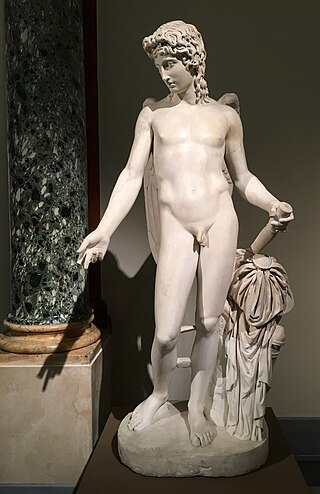
In Greek mythology, Eros is the Greek god of love and sex. His Roman counterpart is Cupid ('desire'). In the earliest account, he is a primordial god, while in later accounts he is described as one of the children of Aphrodite and Ares and, with some of his siblings, was one of the Erotes, a group of winged love gods.

Love Is All You Need is a 2012 Danish romantic comedy film directed by Susanne Bier and starring Pierce Brosnan and Trine Dyrholm.

La Flora, o vero Il natal de' fiori is an opera in a prologue and five acts composed by Marco da Gagliano and Jacopo Peri to a libretto by Andrea Salvadori. It was first performed on 14 October 1628 at the Teatro Mediceo in Florence to celebrate the marriage of Margherita de' Medici and Odoardo Farnese, Duke of Parma. Based on the story of Chloris and Zephyrus in Book V of Ovid's Fasti, Salvadori's libretto contains many allegorical references to the transfer of political power, the beauty of Tuscany, and the strength of the Medici dynasty. The score of La Flora is one of only two still in existence out of Gagliano's 14 published stage works. Several of its arias are still performed as concert pieces.
















